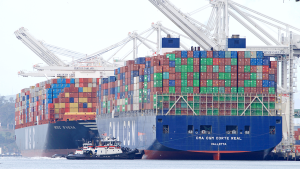The coronavirus, which has been declared a pandemic by the World Health Organization, is wreaking havoc on the markets and painting an uncertain future for the Canadian economy, especially its energy sector.
Prices on March 9 for West Texas Intermediate crude fell by nearly 25 per cent and Brent crude lost about 24 per cent. The plunges were the largest percentage declines since the early 1990s.
Alex Carrick, chief economist for ConstructConnect, offered his insights into the situation.
“It is all tied to the Coronavirus problem,” he said. “The demand for oil has gone down a lot. Everywhere you look things aren’t as active as they were.”
He noted that China has closed factories, air travel is dropping and major entertainment events have been postponed or cancelled.
“All these things combined have an impact on the total economy and GDP and that cuts into demand for oil and impacts the price as well. The whole economy is being impacted by this,” he said. “The unknown is just how big a deal the virus is going to be. China is saying that it is getting back to business as usual. They are claiming it is under control.”
However, Carrick noted that China is a massive country with very strict control and its government also could be controlling the message to make things appear better than they are.
The oil markets are also being hit with news that Russia and OPEC could not agree to cut production of oil to stabilize prices. And Saudi Arabia is preparing to increase its output to maintain its market share which could further impact oil prices.
“Whether they continue to do so is up in the air,” said Carrick, noting that last time Saudi Arabia attempted this, its own government finances suffered. Also, oil production in the country is now done through a publicly traded company and shareholders could put pressure on officials.
As for the Canadian industry, Carrick said it seems Teck Resources may have been shrewd to cancel its Frontier mining project in Alberta and other companies will have to make adjustments. But the lessons of the recent oil slump may prove handy.
“The Canadian oil producers, the big ones, had to learn to get their costs way down,” said Carrick. “The really big ones will probably be fine. But for lots of producers, oil at 30 bucks or less a barrel is a real hardship.”
Carrick explained that the crisis could also create a huge amount of competition for lending which will leave banks spread thin.
“In terms of the oil market, we saw this happen in 2014 through 2016. Syncrude and the big ones did adjust and made their way through it but having this with a health scare – I don’t think SARS was as big as this is,” said Carrick.
He explained that the economic cycle has been running strong for the past decade but it can’t keep it up forever.
“Cycles just don’t keep going that long and a positive cycle depends a lot on consumer confidence and have good psychology and a prevailing sentiment of feeling good about things,” he said. “And after ten years, you kind of know that something could push you over the edge.”
Carrick said that a recession isn’t just possible, but likely.
“I don’t see how we can’t have a recession,” said Carrick, adding that recent economic projections are out the window. “Things have cut back so much. How can this not tip the economy right down to zero growth? I think the likelihood of recession is pretty darn high.”
Alberta Premier Jason Kenney announced the province’s economic woes impact the entire country and Ottawa should provide assistance. Kenney said he will emphasize job protection and economic relief for workers and employers threatened by COVID-19 and the international oil price war as he joins federal, provincial and territorial leaders in Ottawa at the First Ministers’ Meeting.
“Alberta and Canada are currently in uncharted territory, facing an economic crisis complicated by a public health threat, so it’s more important than ever for Canada’s premiers and prime minister to be laser-focused on protecting jobs and providing relief,” said Kenney “I’m looking forward to ensuring Alberta jobs and the unique concerns of our provincial economy are priorities on the national stage.”
Kenney added that shocks to the province’s energy industry from an oil price war between Russia, Saudi Arabia and the United States is a national economic concern, not just a western issue.
“It will require federal as well as provincial help to protect workers and employers, including measures such as payroll tax relief, job-creating stimulus, and access to capital to ensure our companies do not become collateral damage in a geopolitical economic war and to help our economy survive the worst that is ahead and emerge stronger when it ends,” he said.











Recent Comments
comments for this post are closed